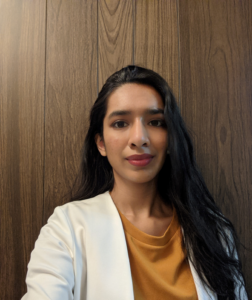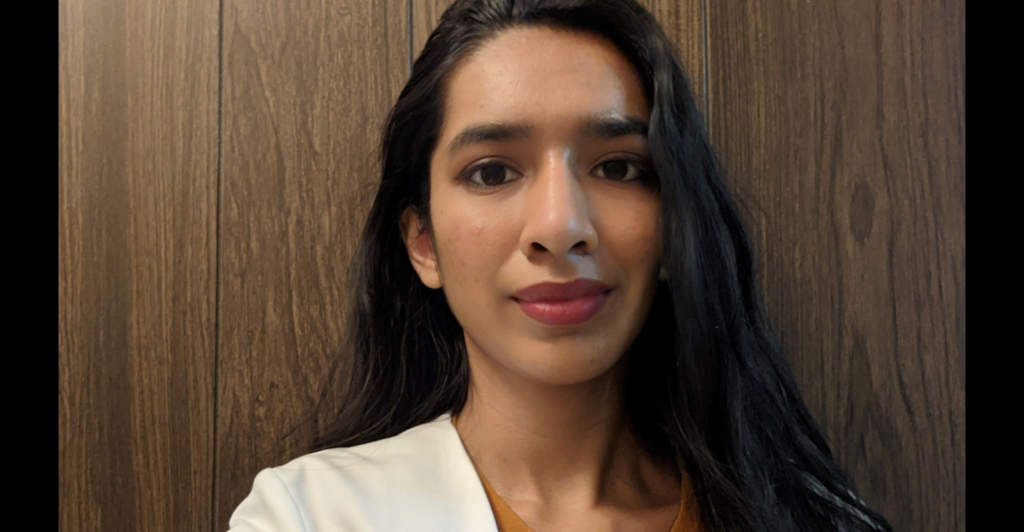We’re taking time to get to know the members of the GSA’s Early Career Scientist Committees. Join us to learn more about our early career scientist advocates.

Aishwarya Kothari
Community and Membership Engagement Subcommittee
Montana State University
Research interest
I am a fourth-year PhD student at Montana State University studying plant genetics. My interests are in the fields of epigenetics and molecular biology as I work toward improving human health and nutrition through increased access to quality food.
As a small step to this ambitious goal, I study the effects of heat stress in wheat at the molecular level. My current research objective is to use functional genomics—specifically ChIP, ATAC-Seq, and RNA-Seq—to identify molecular mechanisms of wheat grain development in response to heat stress. The complexity of the wheat genome makes it difficult to identify stress-tolerant genes and incorporate them into breeding. However, determining the effects of heat stress on transcriptome and chromatin accessibility in developing wheat spikes will potentially enhance cereal breeding. My research also involves the use of a class of plant growth regulators, brassinosteroids, to improve stress tolerance by altering plant response to stress during development. Brassinosteroids have a significant role in plant growth and development and in stress-response regulation. In the future, I want to study the effects of these plant hormones in conjunction with whole genome sequencing to better understand chromatin dynamics and the internal mechanisms of hormonal action in plant systems towards stress-tolerance.
As a PhD-trained scientist, you have many career options. What interests you the most?
After graduating, I am interested in doing research in industry—preferably related to sustainability and environmental effects. To protect our planet, we must take steps to slow down and control climate change.
I am specifically interested in sustainably growing crops with high nutritional quality that can cope with climate change without loss in yield. As the population increases, so does the demand for more food and better health; these increases then cause food prices to skyrocket, making healthy-eating and better-quality food very expensive.
My main goal is to provide research support to agriculture industries by establishing various methods to develop new, tolerant plant varieties without impacting the environment. Growing up in India, an agriculture-based country where nearly 50 percent of the farmers face issues pertaining to crop health and yield losses, greatly influenced this goal. The farmers struggle each year to get their crops to the market and suffer huge losses due to natural disasters. Additionally, the agriculture sector in India is not fully equipped with highly sophisticated techniques in molecular breeding, and I wish to fill that gap.
My undergraduate degree in biotechnology cultivated my passion for research. As an undergraduate student, I worked on diverse projects involving plant tissue culture, food quality, and genetics. Being a plant scientist will help me hone my skills in sophisticated molecular techniques and in visualizing agronomic characteristics of vigorous plants, which will guide me on proper management, breeding, and engineering practices.
In addition to your research, how do you want to advance the scientific enterprise?
I am a strong advocate for promoting science communication, especially to the general public. There have been many instances where information was poorly communicated and misconstrued, causing a lot of panic. Effectively sharing scientific findings with the public will promote scientific advancements at a faster pace. Additionally, instilling scientific knowledge in children at an early age may encourage them to pursue science in the future.
My personal ambition is to help international students and scientists. Being one myself, I know the hardships we must face to fit into the scientific community outside of our home countries. Also, not all countries have the resources required to enhance the abilities of their early career scientists, limiting their potential. Having forums like the Early Career Leadership Program makes it easier to connect with scientists all over the world and share our experiences. Making such forums more widespread and accessible to everyone is the next step.
Along with that, promoting mental well-being among students is one of my recent goals. Research has shown that almost 40 percent of graduate students deal with depression and anxiety. This was especially prevalent during the pandemic. The uncertainty during these times—mixed with the competitive nature of the scientific enterprise—takes a toll on the mental well-being of students, affecting their performance, academically and beyond. Therefore, supervisors, faculty, and higher management need to recognize their influence on the overall well-being of graduate students and postdocs. They can help enhance the graduate student experience by promoting a healthy work-life balance.
As a leader within the Genetics Society of America, what do you hope to accomplish?
I have wanted to engage in professional career development activities since I was an undergrad. Now as a graduate student, I feel strongly that we need to invest in career development workshops and events for early career scientists. Being an Early Career Leader at GSA will expand my network and knowledge; everything I learn here I can bring back to my institution and work toward implementing it. The demand for professional development workshops for scientists is increasing. Hence, it is imperative that we bring this much-needed content to early career scientists.
Ultimately, through my efforts to engage early career scientists in various opportunities of professional and personal development, I want to foster a healthy and inclusive culture of welfare in scientific communities.
Previous leadership experience
- Graduate Wellness Champion, Montana State University, 2020–2022
- International Peer Advisor, Montana State University, 2017–2018
- Student Engagement Global Ambassador, Montana State University, 2017–2018
- Orientation Leader, Montana State University, 2016–2018




